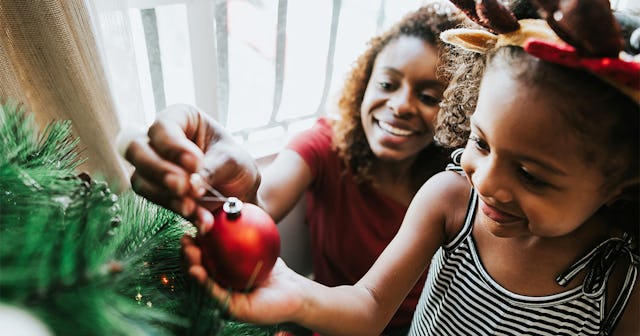Why Christmas Can Be Good For Our Mental Health

I absolutely love Christmas. As soon as Halloween is over, I’m all about the merry and bright season. I start holiday shopping in July and blare the Christmas music on November 1st. The kids and I make four kinds of cookies every year and put up our tree the day after Thanksgiving. We even run an entire social media platform dedicated to all-things-Black-Santa. There’s just something about this time of year that has me feeling giddy, almost like I’m on a mental health high.
Christmas really is the most wonderful time of the year. There’s so much about the holiday that’s just so good for our mental health. I checked in with Dr. Rachel Goldman, a clinical psychologist, speaker, clinical assistant professor at NYU Grossman School of Medicine, and consultant in private practice to see what she thinks.
Christmas brings people together.
This year, in particular, more of us may be celebrating the season friends and family — as safely as possible, of course. Dr. Rachel says that gathering “reminds many of us that we are not alone.” Additionally, gathering reminds us “we are in this together.” The past several years, with a piping hot political climate and the pandemic, we’ve all felt the weight of difference. Christmas can bring about unity and solidarity. My adoption and trauma training has informed me that people are hard-wired to connect with other people—something we can do at Christmas.
Christmas is predictable.
Many families have Christmas traditions that bring us comfort and joy. Tradition is not only expected, but predictable, which can ease anxiety. Dr. Rachel says that these traditions “can be a good distraction from the pandemic and daily stressors” as well as struggles. She adds, “As humans, we crave familiarity.” Christmas not only offers that familiarity, but also “structure and predictability.” Perhaps you sense some serious zen just reading this and thinking about your favorite holiday meal, your family’s gift exchange, or choosing a Christmas tree to put up in your living room.
Christmas forces us to change our pace and focus.
We can get stuck in the mundane hustle-and-bustle of everyday life, ranging from our jobs, our kids’ extracurriculars and homework, and also in our relationships. Christmas, yes, can make us busy, but in a more gratifying way. We might feel more accomplished when we find the perfect present for a relative. Perhaps we sense more calm when we plop on the couch at night and enjoy the twinkling lights on our Christmas trees. The holidays change our pace—often for the better—which can increase feelings of joy. Dr. Rachel told me, “The holidays allow us to take a step back from the typical grind.” We also may enjoy the perk of a day or two off work, and we get to “shift gears and slow down.” (That is, if we manage to stay offline!)
Christmas gives us the opportunity to be more social.
The pandemic had many of us experiencing isolation. Christmas is a great excuse to get together with family or friends—especially if you’ve been avoiding social interaction for the past year and a half. Dr. Rachel shares that we should “make a plan to get together with someone, or make a plan to do something a little different.” An example would be to “create a new tradition for yourself like volunteering your time at a shelter.” She adds, “Our thoughts, feelings, and behaviors are all linked.” If we are always isolating—especially unnecessarily–we “may have negative thoughts which would then impact how you feel and would then impact your actions.”
Christmas encourages us to set boundaries.
We all know many (maybe you included) who struggle during the Christmas season. Two main stressors are finances and toxic family situations. Dr. Rachel encourages us to “acknowledge that this is a tough time for you, and that is okay.” We aren’t required “to feel jolly because people around you are.” I want to add, just because someone is your family member, doesn’t mean you are obligated to spend time with them. It’s easy to slip into a negative space when your finances or a family member is dampening your holiday spirit. This is a great year to put up some boundaries. For example, if a gift exchange is too expensive for you, suggest an alternative or simply decline to participate. It’s also fine to bow out of a get-together that drains you, especially if that toxic-relative is going to be there. As my own therapist once told me, “Boundaries are gifts.” In this case, a gift you give yourself.
Christmas reminds us to get the help we need.
Dr. Rachel shares, “Mental health does not take a break just because it is the holiday season.” In fact, the holidays can add to our already-existing struggles. Though we all love a cheesy Hallmark Christmas miracle, the reality is the winter blues, financial stress, the loss of a loved one, and many more factors can amplify or lead to anxiety or depression. It’s important to reach out to a mental health professional. Likewise, if we notice a loved one struggling, we can encourage them to seek professional help. Dr. Rachel shares, “Help is always available and it feels good to not only receive help, but also to help others.”
The key to a holly jolly holiday is not to take on too much—or too little. Celebrating the season requires us to be honest with ourselves and others. We have to learn that it’s okay to say no, but it’s also a good idea to indulge in new adventures that may just bring us joy. 2020 and 2021 have been particularly difficult years for many of us. Perhaps our best clapback is to take care of our mental health. ‘Tis the season for honoring our hearts and minds.
This article was originally published on